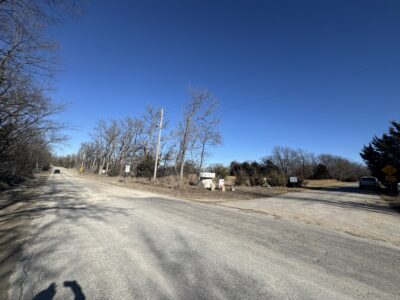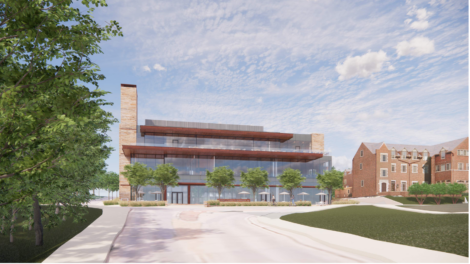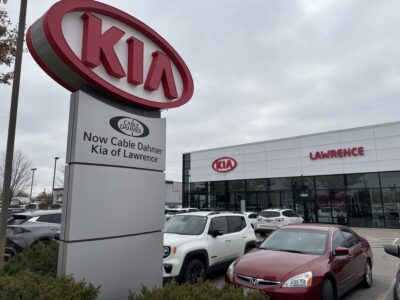
Trial date challenging Kansas Sky Energy solar project pushed back; lawsuit now near Trump deadline for tax credits
Evergy says it is still confident large solar farm will be able to proceed

photo by: Adobe Stock
Aerial drone view of solar panels at a solar energy generation farm at Sunset in South Wales, UK
The future of a proposed $234 million solar farm north of Lawrence is facing a pair of calendar challenges — one driven by the Douglas County District Court and the other by President Trump.
The Kansas Sky Energy Center — a 600-acre project that would install enough solar panels in northern Douglas County to power 30,000 homes — already is facing an existential threat from a lawsuit filed by neighbors of the project who contend it will create stormwater problems and violate numerous county codes.
A judge has stopped all work from beginning on the site — a series of farm fields near Midland Junction — while the case is underway. If the neighbors ultimately win the lawsuit, it is quite possible the solar project’s developers would have to abandon all plans.
But the project could still lose even if it wins the lawsuit, due to a timing issue created by the Trump administration. In order to comply with a recent executive order, the solar project will need to be “substantially under construction” by July 6, 2026, if the project wants to qualify for lucrative federal tax credits.
By itself that date may be only mildly challenging, but when combined with the calendar of the local court it becomes more so. Douglas County District Court Judge James McCabria recently pushed back by nearly four months when the trial in the case could begin. The earliest the trial now could begin is April 6.
Given that the trial is set to be a bench trial — one where the judge issues a ruling instead of a jury — a decision may come weeks after the trial ends. Then, there is the opportunity for an appeal in the case, which could take months.
It is not hard to envision that the lawsuit could still be underway when the July 6 date arrives. Thus far, though, Evergy — the electric utility who will own and operate the plant — isn’t expressing concern the calendar could derail the project.
“While we cannot comment on specifics, Evergy is confident in meeting the requirements for tax credits for the benefit of Evergy Kansas Central customers, including those in Douglas County,” spokesperson Courtney Lewis told the Journal-World via email when specifically asked about the closeness of the April 6 trial date and the July 6 federal deadline.

photo by: Chad Lawhorn/Journal-World
High voltage electric transmission lines run through a farm field near the site of the proposed Kansas Sky Energy Center. Developers of the solar project say the presence of the lines is one of the reasons the site would work well for the project.
Receiving the tax credits is expected to be critical to the feasibility of the Kansas Sky Energy Center. While Evergy stopped short of saying it wouldn’t build the project without the credit, Lewis said the credits are an important way to “lower the price of electricity generated from the solar farm.”
To put a finer point on the matter, the tax credits easily could be worth tens of millions of dollars for the project. If the project received 30% in tax credits — a common amount for commercial projects — that would equate to about $70 million in tax credits.
Nothing in Evergy’s response indicates the company is thinking about proceeding with the project without the credits.
“Evergy remains confident in Kansas Sky’s qualification for tax credits,” Lewis said via email.
That means the dates will be relevant, and so too will be the fine print. The IRS this month changed some of that fine print related to what companies must do to qualify for the tax credit. Trump, who has expressed skepticism about the value of green energy, set the July 6 deadline for companies to have their projects substantially under construction. The Internal Revenue Service, however, was left to determine what “substantially under construction” meant.
In the case of large solar farms, it significantly tightened the definition. In the past, a project could be considered substantially under construction if the developer of the project had already spent at least 5% of the project’s estimated total cost.
That provision has now been eliminated for large solar farms. Such projects must now meet an actual physical test related to construction that is underway. In other words, true construction work has to be underway on the project. The test further requires that the work be integral to the project, like actual installation of panels and other components. Interestingly, site preparation and clearing of the property does not count as significant work, nor does any of the engineering and planning, according to various consultants who advise the industry.
That’s important because such site work would be some of the first activity to take place on the property. Given that the trial date and July 6 tax credit deadline are only three months apart, it is hard to envision how anything other than site work would be underway at the site in such a limited time period.
One possibility to meet the requirement, however, is that significant work that is done off site but is specifically for the project can be counted as evidence that substantial construction work has begun. According to various websites of solar consultants, such offsite work primarily involves the construction of custom components that aren’t part of the normal inventory of a solar manufacturer. Such work also has to be done under a binding contract between the solar developer and the solar manufacturer.
Perhaps that provision would allow the Kansas Sky Energy Center to meet the test even if work hadn’t begun on the actual site of the project. However, that strategy also sounds like one that will rely heavily on the solar developers making their case to the IRS.
One issue that doesn’t appear to be in play for the project is whether the Kansas Sky Energy Center will be using too many solar parts from China and other countries the U.S. has deemed as problem importers. Another Trump order prohibits any solar projects in 2026 and beyond from receiving 60% or more of its components from China, North Korea, Iran and Russia. Lewis told the Journal-World that the solar panels for the Kansas Sky Energy project do not come from any of those countries.
Trump last month also issued an executive order that sought to limit taxpayer subsidies for solar projects built on prime agricultural land. The Kansas Sky Energy project is proposed for farmland that is generally regarded as some of the better farmland in the county, although its official soil ratings vary depending on the exact location. According to national media reports, though, the executive order appears to primarily impact solar assistance programs that were offered by the US Department of Agriculture, which may not be used much on a project like Kansas Sky Energy.
As for the calendar issues with this project, there is no guarantee that the lawsuit — which was filed in May 2024 — will go to trial in April. The court can push back the trial date if matters require it. That’s what happened last month when McCabria issued a ruling moving the trial date from Dec. 10 to April 6 in order to give both sides more time to secure expert witnesses and conduct depositions. Neither the defense nor plaintiffs objected to the delay.
Evergy, nor its development partner in the project, is not a party to the lawsuit. The neighbors — led by Grant Township — sued Douglas County, but not the utility company or developer. The court rejected a motion for the developers to join the lawsuit.
While the solar project faces a legal challenge at the county level, it has won its necessary approvals from the Kansas Corporation Commission, which regulates rates and operations of public utilities.
“Evergy is still pursuing the Kansas Sky project and was pleased to see it approved by the Kansas Corporation Commission in July,” Lewis told the Journal-World “We feel that our ‘All of the Above’ energy strategy benefits Kansas customers. Kansas Sky is a well-sited project in an energy community with access to substantial tax benefits for our customers.”







